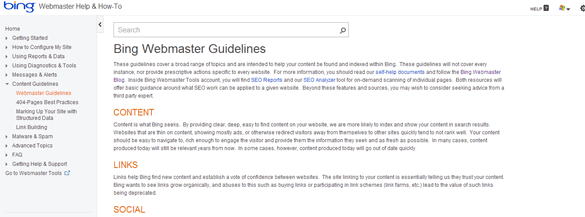Bing didn’t have a set of Webmaster Guidelines before, but since Friday, the main rival to Google search decided to let site owners know just what to expect, in terms of SEO, technical and social, when it comes to Bing search engine rules. The Bing Webmaster Guidelines can be found in the Help section of Bing Webmaster, under the Content Guidelines section.
 Bing’s Webmaster Guidelines are intended to help most business owners understand the broad strokes of search marketing.
Bing’s Webmaster Guidelines are intended to help most business owners understand the broad strokes of search marketing.Like Google Webmaster Guidelines, Bing’s guidelines cover a broad range of topics, from content, to links, social and beyond.
Content
As expected, Bing’s main focus is the site content, which needs to be clear, easy to find, as well as deep. Bing warns that sites with thin content, that are showing mostly ads, will not rank well.
Links
If once buying links was a guaranteed recipe to rank well in most search engines, things have changed recently. Like Google, Bing doesn’t like sites buying links or participating in link schemes and warns that the lead value of such links will be deprecated. But the search engine still seems to value natural, organic links.
Social
Bing is very clear when it comes the impact of social for Bing search results:
Social media plays a role in today’s effort to rank well in search results. The most obvious part it plays is via influence. If you are influential socially, this leads to your followers sharing your information widely, which in turn results in Bing seeing these positive signals. These positive signals can have an impact on how you rank organically in the long run.
Technical issues
Here, there are no major differences compared to Google Webmaster Guidelines. Bot search engines stress the importance of fast page load times (PLT) for user satisfaction, but Bing makes it clear that slow PLT may impact rankings:
If they came from our search results that may appear to us to be an unsatisfactory result that we showed.
Robots.txt, sitemaps, canonical URLs and redirects, as well as site technology (Flash, JavaScript, etc.), play important roles too.
SEO
Bing considers SEO a valid practice to improve a website, making content easier to find and more relevant, however they warn that although SEO may make a site more appealing to the search engine, SEO-related work is no guarantee of rankings or the possibility to receive traffic from Bing. The new Webmaster Guidelines show a few best-practices expected from those who do decide to perform SEO work on their sites.
Like Google, Bing advises to avoid cloaking, meta refresh redirects, all kinds of link schemes and duplicate content. What’s new in Bing Webmasters Guidelines is the advice to avoid participating in social media schemes that seek to artificially exploit a network effect to game the algorithm.




![[SEO, PPC & Attribution] Unlocking The Power Of Offline Marketing In A Digital World](https://www.searchenginejournal.com/wp-content/uploads/2025/03/sidebar1x-534.png)